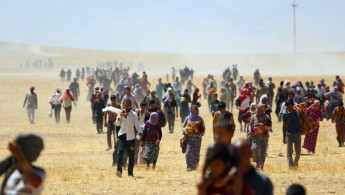Iraq government not doing enough to heal wounds of Yazidi genocide, says community leader
Eight years since the Yazidi genocide by Islamic State group militants, the vulnerable religious and ethnic minority remain locked in dire conditions and suffering due to the negligence of the Iraqi government, community leaders say.
The Yazidis, who live mostly in areas around Nineveh province in north west of Iraq, were massacred and enslaved wholescale on 3 August 2014 by IS militants who seized the town of Sinjar.
IS extremists launched a genocidal campaign against the minority involving killings, abductions, rape and enslavement.
The Iraqi army and Kurdish Peshmerga forces were widely critisised for failing to defend the town and leaving Yazidis at the mercy of the extremists. Eight years on, and many issues remain unresolved.
"After eight years of the Yazidi genocide, the Yazidis have many issues and their plights still remain unsolved," Khidir Dumley, a special investigator in conflict and peace-building and consultantant for several international NGOs in Iraq, told The New Arab.
"First, unfortunately the Iraqi federal government still did not dare to recognise our genocide, despite the fact that lawmakers from more than 10 world countries have recognised the Yazidi genocide.
"The Yazidis are sceptical about the efforts of the Iraqi government to bring IS leaders to justice. Moreover, the Yazidis are yet to be compensated, and the fate of nearly 3,000 Yazidi girls and women remains unknown, while nearly 80 mass graves of the Yazidis are yet to exhumed."
Nadia Murad, a former captive of IS, Nobel Peace Prize winner, and UNODC Goodwill Ambassador, on Wednesday - the anniversay of the genocide - expressed her grievances in a statement.
"Last year, on the seventh anniversary of the Yazidi Genocide, I wrote about my hope that Yazidis would not still be in the same dire position on the eighth anniversary," she said.
"And yet, here I am a year later with the same message: genocides do not occur overnight, and neither does recovery. The Yazidi people cannot recover and rebuild without meaningful change and international support."
On the #YazidiGenocide’s 8th anniversary, I worry that on the 10th & 20th anniversaries,Yazidis will still be struggling to rebuild our lives. To change this reality, we need to change how we support communities affected by conflict: https://t.co/nSOpJdu0s2 pic.twitter.com/a9kRStZBep
— Nadia Murad (@NadiaMuradBasee) August 3, 2022
The Iraqi parliament passed the Yazidi Survivors Law on 1 March 2021, which provides compensation for survivors of IS crimes, including women and girls who were subjected to sexual violence.
Dumley said the law has yet to be implemented, accusing the Iraqi federal government of negligence in providing the necessary budgets and staff to enact it.
"The Iraqi government is not serious in doing anything for the Yazidis, but often makes shows in the media that it has done a lot for the Yazidis," Dumley said.
After the fall of Sinjar, the Yazidis established the armed Sinjar Resistance Units (YBS), with the help of the Kurdistan Workers Party (PKK) to defend their vulnerable community. Sinjar is now run by an administration close to the YBS.
Sinjar was retaken from IS in 2015 by fighters from the autonomous Iraqi Kurdistan Region's Peshmerga and from Syrian Kurdish units, backed by the US-led coalition. Iran-backed units from within the Popular Mobilsation Units took surrounding territories.
The Iraqi federal government and the Kurdistan Regional Government (KRG) in 2020 signed a deal to normalise the situation in Sinjar.
It saw a plans for a new administration for the town and all armed groups expelled. But the agreement has yet to be implemented since both governments did not negotiate with the YBS, who have refused to hand the town over to a new administration.
TNA contacted Iraqi government spokesperson Hassan Nadhim and the spokesperson for the Joint Operations Command, Major General Tahsin al-Khafaji, but did not receive comment by the time of publication.
Turkey sees YBS as a branch of the banned PKK, conducting many airstrikes on targets in Sinjar, leading to several civilian casualties.





 Follow the Middle East's top stories in English at The New Arab on Google News
Follow the Middle East's top stories in English at The New Arab on Google News


